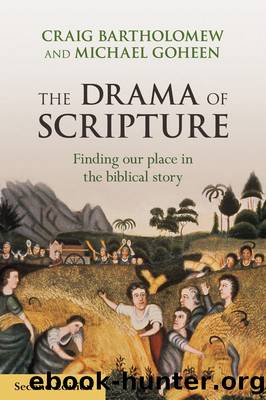The Drama of Scripture: Finding Our Place in the Biblical Story by Craig G. Bartholomew & Michael W. Goheen

Author:Craig G. Bartholomew & Michael W. Goheen
Language: eng
Format: mobi
Tags: Christian
ISBN: 9780801049569
Published: 2014-07-14T23:00:00+00:00
Figure 19 Ass on a Cross
And yet the early church had the temerity to point to this event—the crucifixion of their leader—as the mighty act of God. What utter foolishness!64 Little wonder that the church was mocked by its opponents. A drawing scratched on a wall (graffito) from the early Roman Empire shows the body of a man with the head of an ass nailed to a cross, and a man worshiping it (see above). Scrawled below is the mocking caption, “Alexamenos worships god.” Apparently some slave or child was poking fun at someone with this early cartoon. How stupid, how absurd, to worship a crucified god! The claim that Jesus’s death was a mighty act of God must have seemed utter foolishness anywhere within the first-century Roman world.
The Romans were not alone in this opinion. The sheer horror and degradation of death by crucifixion made it impossible also for Jews to accept this as an event that might reveal the hand of their God. Hadn’t the Old Testament prophecies spoken of the Messiah coming in glory and victory? Surely he was to be a great and mighty ruler, dispensing justice to a new world empire. His kingdom was to stretch from one end of the earth to the other. As the Jewish Encyclopedia puts it, “No Messiah that Jews could recognize could suffer such a death; for ‘he that is hanged is accursed by God’” (Deut. 21:23; cited in Gal. 3:13).65 Moreover, the cross was the place where all those who rebelled against the Roman Empire—including many false messiahs—ended their lives. For the Jews, “crucified Messiah” was an oxymoron. The cross as God’s mighty act was (and is) a stumbling block to them (1 Cor. 1:23).
Crucifixion in the New Testament
The New Testament is unique in ancient literature in interpreting the crucifixion in a positive way, as the greatest of God’s actions in history. Paul proclaims that “the message of the cross is foolishness to those who are perishing, but to us who are being saved it is the power of God” (1 Cor. 1:18). But he and the other New Testament writers are entirely aware that their view of this event attracts scorn. To the Romans, the cross is utter foolishness: crucifixion is merely the worst of the punishments routinely meted out to Rome’s enemies. They are humiliated, defeated, tortured beyond human endurance, exposed in their weakness—and then they die. Beyond that, the cross is a random act of cruelty.
Yet the early church makes the bold and fantastic claim that the cross is the central act of God in all of human history! This boldness is the product of a radically different perspective because the church looks at the cross through the lens of the resurrection.
It is Jesus’s return from the dead that validates his claim to be God’s anointed Messiah. When one begins to look at the cross through the lens of the resurrection, what at first appears to be foolishness is really the wisdom of God. What seemed to be weakness is really the power of God, conquering human rebellion and Satanic evil.
Download
This site does not store any files on its server. We only index and link to content provided by other sites. Please contact the content providers to delete copyright contents if any and email us, we'll remove relevant links or contents immediately.
The Five People You Meet in Heaven by Mitch Albom(2834)
Name Book, The: Over 10,000 Names--Their Meanings, Origins, and Spiritual Significance by Astoria Dorothy(2488)
Real Sex by Lauren F. Winner(2466)
The Holy Spirit by Billy Graham(2408)
The Secret Power of Speaking God's Word by Joyce Meyer(2248)
0041152001443424520 .pdf by Unknown(2214)
How The Mind Works by Steven Pinker(2207)
Ancient Worlds by Michael Scott(2098)
The Meaning of the Library by unknow(2064)
ESV Study Bible by Crossway(2064)
The Gnostic Gospels by Pagels Elaine(2023)
Churchill by Paul Johnson(2006)
MOSES THE EGYPTIAN by Jan Assmann(1968)
The ESV Study Bible by Crossway Bibles(1887)
Jesus by Paul Johnson(1882)
The Nativity by Geza Vermes(1845)
Ancient Near Eastern Thought and the Old Testament by John H. Walton(1844)
The Complete Dead Sea Scrolls in English (7th Edition) (Penguin Classics) by Geza Vermes(1836)
City of Stairs by Robert Jackson Bennett(1822)
